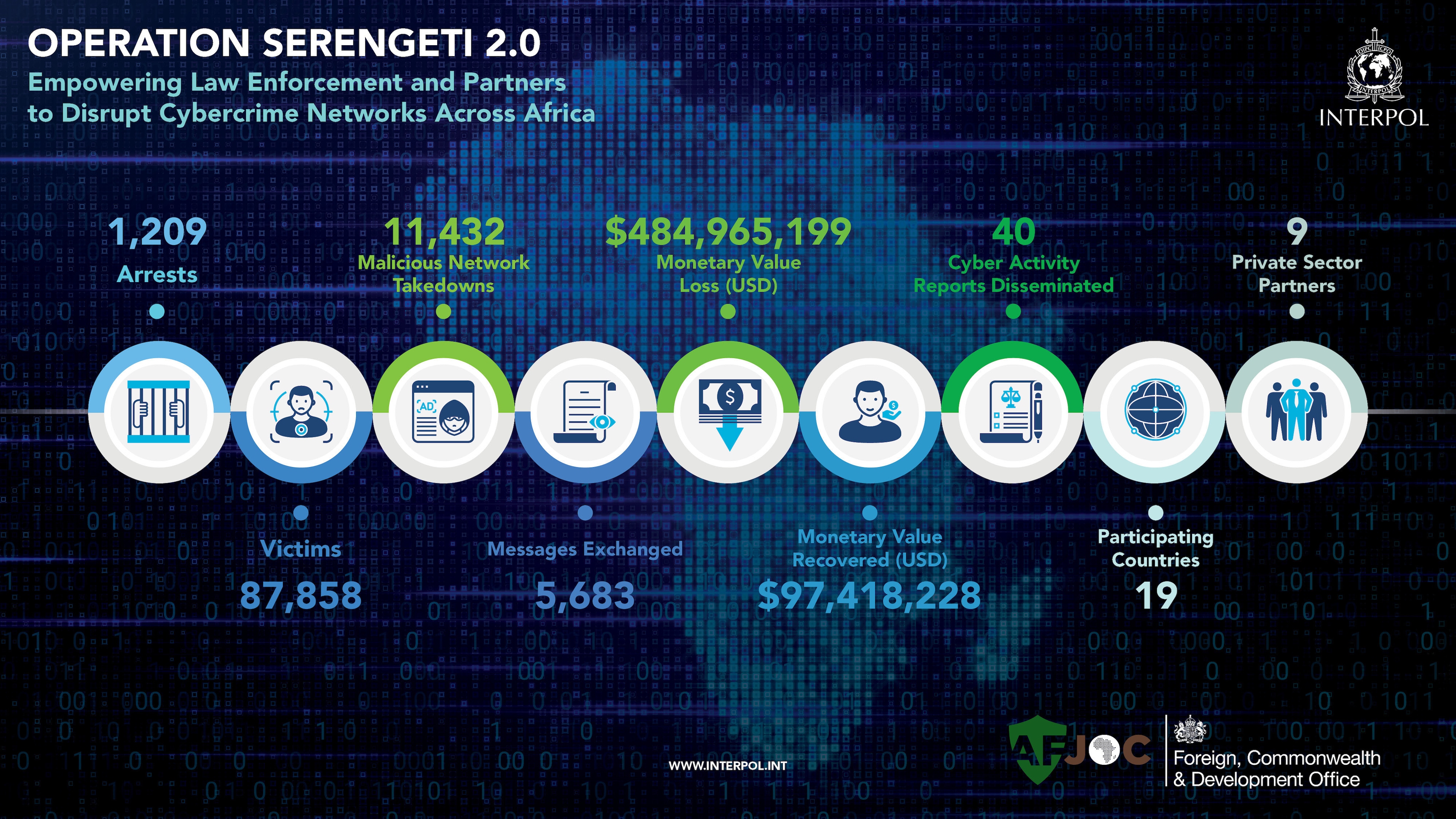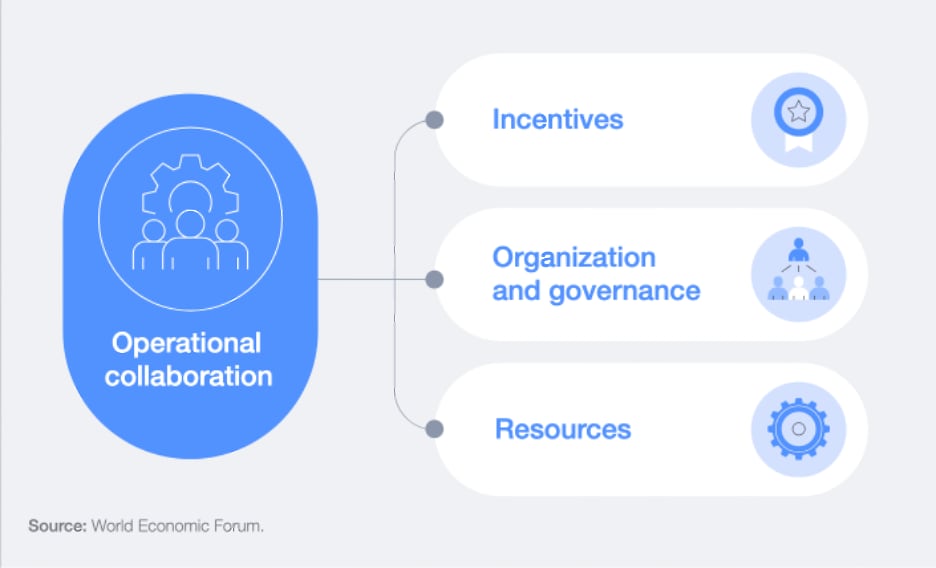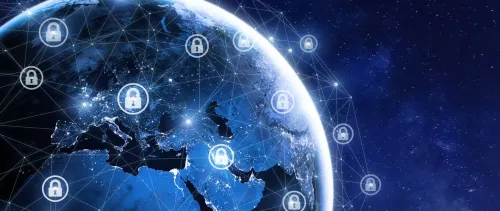
Forged passports seized from cybercriminals in Zambia as part of Operation Serengeti 2.0, August 2025. Image: INTERPOL
- The ever-evolving cybercrime tools and services "market" might be the most frictionless on earth, allowing criminals to victimize societies at scale.
- However, countries are fighting back: A recent joint effort by INTERPOL and AFRIPOL across 18 countries saw 1,200 arrests and $97 million recovered.
- The success of this operation shows that innovative collaboration among law enforcement, industry and cybercrime experts can successfully combat cybercrime.
As the global economy continues to digitize, cybercriminals have completely ignored any talk of deglobalization. Their technical and personal networks continue to expand across regions, making it increasingly difficult to disrupt their online criminal activities.
A combination of law enforcement and private-sector experts has, however, demonstrated a proven, transferable model capable of disrupting these international networks at scale.
In August 2025, as part of INTERPOL and AFRIPOL’s Operation Serengeti 2025, authorities in Angola dismantled 25 cryptocurrency mining centres. Here, at least 60 Chinese nationals were illegally validating blockchain transactions to generate cryptocurrency.

As a part of the operation, authorities also seized 45 illicit power stations valued at over $37 million. The energy usage of the illegal cryptocurrency mining and IT equipment will now, instead, be used by the Angolan government to support power distribution in vulnerable areas.


“Each INTERPOL-coordinated operation builds on the last, deepening cooperation, increasing information sharing and developing investigative skills across member countries. With more contributions and shared expertise, the results keep growing in scale and impact. This global network is stronger than ever, delivering real outcomes and safeguarding victims.”— Valdecy Urquiza, Secretary General of INTERPOL
In the same operation, cybercriminals were arrested in Côte d’Ivoire for activities that originated in Germany. In Zambia, authorities dismantled a cryptocurrency investment scam that defrauded at least 65,000 victims of an estimated $300 million.
Have you read?
What this tells us about cybercrime
As was the case in Côte d’Ivoire, cybercrime is difficult to disrupt because criminals usually target victims across borders. This severely complicates enforcement, as police are largely constrained to operate within their own national jurisdictions.
Luckily, law enforcement is steadily improving its ability to coordinate cybercrime disruption across borders, enhancing the insights it gains into cybercriminal activities by working in partnership with experts in the private sector. Joint operations like Serengeti, supported by actionable insights into cybercrime from outside of law enforcement, are now more frequent, more sophisticated and increasingly effective in dismantling international criminal networks.
Have you read?
- Why collaboration is key to disrupting the economics of cybercrime
- Collaborations between industry experts and the public sector are disrupting cybercriminals. Here’s how
Cross-border law enforcement networks to disrupt cybercrime
Operation Serengeti 2025 was underpinned by a trusted coordinator, INTERPOL. It acted as a hub for the sharing of expertise and assessments between law enforcement, the private sector and non-governmental collaborations like the World Economic Forum-hosted Cybercrime Atlas.
It is essential for law enforcement and its partners outside the public sector to have mechanisms in place to consistently undertake joint operations at scale.
Addressing the continued global proliferation of cybercrime must be addressed head-on and cybercriminals must be held accountable for their crimes – systemically at scale. To achieve a sustained impact, however, collaboration must move from ad hoc support to long-term partnerships.
“By embracing best practices and proven frameworks for anti-adversary partnerships, we can jump-start new and enhance existing initiatives. As the cybersecurity industry matures, holding threat actors accountable is the next step in disrupting cybercrime at scale.”— Derek Manky, Chief Strategist and Global VP, Threat Intelligence at Fortinet
- How is the Forum tackling global cybersecurity challenges?
The World Economic Forum's Centre for Cybersecurity is at the forefront of addressing global cybersecurity challenges and making the digital world safer for everyone.
Our objective is to support individuals and organizations to securely benefit from ongoing digital and technological progress. The independent and impartial platform of the Centre convenes a diverse range of experts from the public and private sectors to reinforce the importance of cybersecurity as a strategic priority and drive global public-private action to address systemic cybersecurity challenges.
Learn more about our impact:
- Cyber resilience: Working with more than 170 partners, the centre is playing a pivotal role in enhancing cyber resilience across industry ecosystems: oil and gas, electricity and manufacturing.
- Partnership against Cybercrime: In collaboration with over 50 partners, the centre is playing a key role in driving public-private cooperation to combat cybercrime through effective insight sharing and collective action.
Want to know more about our centre’s impact or get involved? Contact us.
A key factor in INTERPOL’s success lies in its emphasis on operational collaboration between police forces while acting as a network and enabler of private sector and civil society contributions.
Alongside sharing research, INTERPOL has undertaken sustained, year-on-year efforts to run joint training across Africa, Asia, and the Americas. Such training is often done in collaboration with partners such as the World Economic Forum's Partnership Against Cybercrime and the Cybercrime Atlas. While boosting the efficiency of operations, such joint efforts also boost mutual understanding, trust and knowledge exchange among like-minded partners.
“Our Cybercrime Atlas and Fortinet partnerships with INTERPOL contributed to the successful outcome of Operation Serengeti. This signals yet another impactful milestone and is a shared achievement.”— Derek Manky, Chief Strategist and Global VP, Threat Intelligence at Fortinet
How disrupting cybercrime has moved from competition to collaboration
Efforts like Operation Serengeti 2025 undoubtedly raise the risk of being caught for cybercrime while putting a damper on the possibility of profiting from illegal activities. In the same breath, its success should be seen as an opportunity to heighten collaboration among private sector experts to crush cybercrime.
The last year has shown that better collaboration between law enforcement, industry and cybercrime experts can lead to impactful results that benefit all. By supporting arrests, disrupting illegal online infrastructure and seizing criminal profits, Operation Serengeti proves that collaboration is better than competition.
Private sector industry leaders are seeing its far-reaching benefits.
“Operation Serengeti 2025 is a great example of public-private collaboration and how cross-sector partnerships lead to results in the fight against cybercrime. Microsoft will continue to work with others, including through the Cybercrime Atlas initiative, to go after malicious actors and hold them accountable.”— Steven Masada, Assistant General Counsel, Microsoft Digital Crimes Unit

Alongside initiatives like Cybercrime Atlas, momentum is building for operational collaborations that strengthen collective cybersecurity and effectively disrupt criminal activity. Other key cyber collaborations include the Cyber Defence Alliance, Ransomware Taskforce, Cyber Threat Alliance and the US National Cyber-Forensics and Training Alliance.
The World Economic Forum’s Disrupting Cybercrime Networks: A Collaboration Framework, meanwhile, is leading to the development of repeatable approaches to support collaboration. This framework aims to guide on setting up incentives, governance structures and the resources needed to scale collaborations.
Thanks to such efforts, cyber defenders now have a model to follow that works in practice. It, however, requires ongoing collaboration and sustained momentum across borders and across sectors to effectively combat cybercrime.


